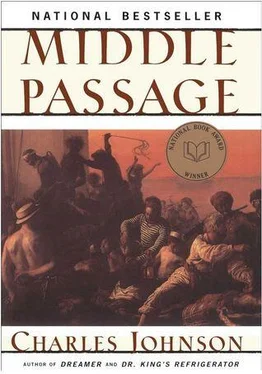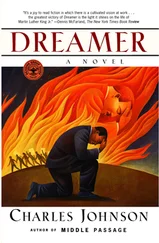I must leave their fighting arts for later, because more fascinating than their globe-spanning travels in antiquity and their style of self-defense was the peculiar, gnomic language the Allmuseri practiced. When Ngonyama’s tribe spoke it was not so much like talking as the tones the savannah made at night, siffilating through the plains of coarse grass, soughing as dry wind from tree to tree. Not really a language at all, by my guess, as a melic way of breathing deep from the diaphragm that dovetailed articles into nouns, nouns into verbs. I’m not sure I know what I’m saying now, but Ngonyama told me the predication “is,” which granted existence to anything, had over the ages eroded into merely an article of faith for them. Nouns or static substances hardly existed in their vocabulary at all. A “bed” was called a “resting,” a “robe” a “warming.” Furthermore, each verb was different depending on the nature of the object acted upon, whether it was vegetable, mineral, mammal, oblong or rotund. When Ngonyama talked to his tribesmen it was as if the objects and others he referred to flowed together like water, taking different forms, as the sea could now be fluid, now solid ice, now steam swirling around the mizzenpole. Their written language — these Africans had one — was no less unusual, and of such exquisite limpidity, tone colors, litotes, and contrapletes that I could not run my eyes across it, left to right, without feeling everything inside me relax. It consisted of pictograms. You had to look at the characters, Ngonyama taught me, as you would an old friend you’ve seen many times before, grasping the meaning-and relation to other characters — in a single intuitive snap. It was not, I gathered, a good language for doing analytic work, or deconstructing things into discrete parts, which probably explained why the Allmuseri had no empirical science to speak of, at least not as we understood that term. To Falcon that made them savages. Just the same, it seemed a fitting tongue for the most sought-after blacks in the world.
Compared to other African tribes, the Allmuseri were the most popular servants. They brought twice the price of a Bantu or Kru. According to legend, Allmuseri elders took twig brooms with them everywhere, sweeping the ground so as not to inadvertently step on creatures too small to see. Eating no meat, they were easy to feed. Disliking property, they were simple to clothe. Able to heal themselves, they required no medication. They seldom fought. They could not steal. They fell sick, it was said, if they wronged anyone. As I live, they so shamed me I wanted their ageless culture to be my own, if in fact Ngonyama spoke truly. But who was I fooling? While Rutherford Calhoun might envy certain features of Allmuseri folkways, he could never claim something he had no hand in creating. I respected them too much to insult them this way — particularly one woman and her eight-year-old daughter, Baleka, who’d caught a biscuit I tossed her one day when talking to Meadows. Her mother snatched it away. She studied it like a woman inspecting melons at a public market, her face growing sharp. She smelled it, she tasted it with a tiny nibble, and spat it out the side of her mouth into the sea. Presently, she stumped across the deck and dropped it back onto my lap. Sliding up behind her, half hidden behind Mama’s legs, Baleka stuck out her hand. Her eyes burned a hole in my forehead. Her mother’s finger wagged in my face, and in the little of their language I knew she sniffed that her baby deserved far better than one moldy biscuit. I could only agree. To square things, that night I shared my powdered beef, mustard, and tea with Baleka: a major mistake. Her expectation, and that of Mama, for sharing my every pan of food became an unspoken contract no less binding between us than a handshake. By and by, we were inseparable. This was how Mama wanted it, having decided her child’s survival might depend on staying close to the one crew member who looked most African, asking me to decipher the strange behavior of the whites and intercede on their behalf. Thus, the child stayed at my heels as I spun rope and, when I was on larboard watch by the taffrail, leaned against my legs, looking back sadly toward Senegambia.
Thus we were at five bells in the forenoon of June 11. The wind blew hard, the sea ran high, filled with thunder rumbles and white tendrils of lightning from the southeast. At my post I was for a time hypnotized by tumbling, opaline blades of ocean, by its vortices that were mirrored in me since we were mainly made of Main, by the way — as the mate said — it seemed to be some monster of energy, without start or finish, a shifting cauldron of thalassic force, form superimposed upon form, which grew neither bigger nor smaller, which endlessly spawned all creatures conceivable yet never consumed itself, and contained a hundred kinds of waters, if one could but see them all. . so hypnotized by this theater of transformations my head spun and eyes slipped after staring too long, my belly trembled, and this was the condition I was in when gusts of strong, skirling wind galed and swung the Republic broadside to windward, pointing her back the way we had come. Loose ropes, carpenter’s tools, and unfastened casks of beef flew everywhere like cannon shot, cracking more than a few skulls. The skipper, who’d been sprawled out, stewed to the gills on his cabin floor, clawed his way topside, shouting “Gangway!” and looked wildly around at those awaiting his orders. Said: “Secure all loose gear.” Cringle shouted back that the helm would not respond. “Mr. Fletcher,” ordered Falcon, “see if the cords are entangled.” The sailmaker checked them and made answer that they were not. “Damme,” said Falcon, “she blows hard.” His fingers clenched fishbelly white, then faintly blue, on the helm, and in his state he was a pitiful sight, hunched forward, pulling the wheelr so hard his temples bulged, barely able to stand. The men saw this. His movements were slower than a man’s submerged, like a mime mocking normality. He was that soused, that unsteady on his feet, and said, crestfallen, aware of his condition, “You have to help me here, Mr. Cringle.” And then it was full upon us: a sea hot with anger, running in ranges like the Andes or the Rockies, and be damned if in the topgallant sails I didn’t see forks of blue lightning. The forecastle was hidden behind curtains of spray. The bows were deep in water. At this point, screams came from the hold. With one hand I clung to the foremast, my head pressed in tightly against Baleka, squeezing her close enough to cut off her wind. And fairly windless was I myself. In this squall, some of the deck hands panicked. Ran from their posts, which was wrong, fell, scrambled below to their hammocks and pleaded with their shipmates to strap them down, screamed again. Others tied themselves to gratings, to the yawl, and to each other. “Hard alee.” The wheel spun in the captain’s hands. “Keep her hard to leeward.” Before long the swirling air and sheets of breaching water overwhelmed him. He relinquished the wheel to Cringle and shouted into a hundred-horsepower wind, “Heave to.” For five minutes nothing could be seen of the ship’s hull — only shaking masts rising like a forest above foamy meerschaum, the sky stretched above like a gridelin scar, and the Republic broaching badly in the wind, popping her nails, her boards creaking like those in an old house, a shrinking casket. Cringle’s lips were skinned back against his teeth. “Heave to it is, if you say so, sir.”
Falcon’s face was crabbed. “Are you makin’ sport of me?”
“No — no, sir!”
What came upon us next is not clear. The instant Cringle spoke, the ship swung around with her face to the west, plunging into a trench, as if into Hell, below water columns that broke over us to the height of the crosstrees — two solid walls on either side, held still as when Moses parted the Red Sea. The sun stood still. The moon stayed. My heart stopped. It has never worked exactly right since, because when the roily waves spanked back, shaking the ship to her ribs, I saw two boys catapulted overboard to drown instantly in the shoal. Therewhile, half the Allmuseri children and women — Baleka’s mother among them — five of Falcon’s sheep, his hogs and fowl, were swept from the deck. The larboard quarterboat was torn away to disappear into the swell.
Читать дальше












